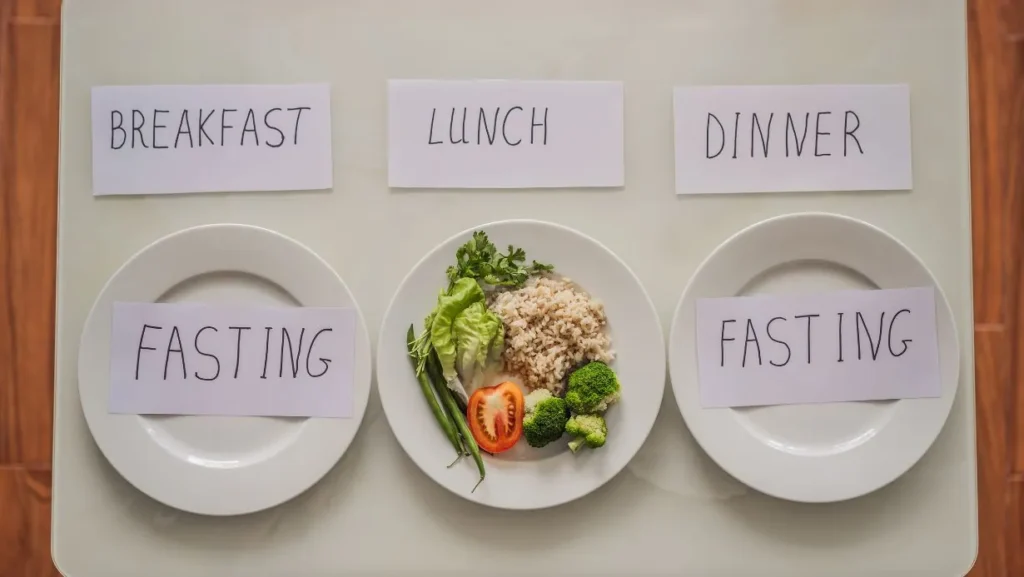In the world of fitness and health, intermittent fasting diet plan has become a trend. It helps people lose weight, improve their health, and simplify their lives. Additionally, it has been shown to have powerful effects on the body and brain and may even help you live longer.
The ultimate guide to intermittent fasting for beginners.
Intermittent Fasting (IF) – What is it?
Fasting and eating alternate in intermittent fasting (IF). Rather than specifying what foods you should eat, it specifies when to consume them. In this sense, a diet is not what it seems, but rather an eating pattern. Typical Intermittent fasting diet plan methods involve fasting for 16 hours twice per week or fasting for 24 hours twice per week.
Throughout human evolution, fasting has been practiced. Ancient hunter-gatherers did not have supermarkets, refrigerators, or year-round access to food. Sometimes they had no food to eat. As a result, humans evolved to have the ability to function for extended periods without food.
It is more natural to sometimes fast than to always eat 3–4 (or more) meals per day. It is also common for people to fast for religious or spiritual reasons, including in Islam, Christianity, Judaism, and Buddhism.
How to Follow an Intermittent Fasting Diet Plan
You can do intermittent fasting in a few different ways – all of which involve dividing the day or week into eating and fasting periods. You eat very little or nothing altogether during the fasting periods.

The most popular methods are:
- 16/8 method: This plan cuts out breakfast and restricts your eating to 8 hours a day, such as 1-9 p.m.In between, you fast for 16 hours.
- Eat-Stop-Eat: This involves not eating for 24 hours once or twice a week, such as when you don’t eat from dinner one day until dinner the next.
- 5:2 diet: By following this diet, you consume 500-600 calories twice a week on nonconcurrent days and eat normally on the other five days.
As long as you don’t compensate by eating more during your eating period, each of these methods should cause weight loss by reducing your calorie intake. Most people find the 16/8 method to be the simplest, most sustainable, and easiest to follow. Additionally, it’s the most popular.
The Effects It Has On Your Cells & Hormones
In your body, several things happen on a cellular and molecular level when you fast. As an example, your body adjusts hormone levels so that stored fat is easier to access. As well as initiating repair processes, your cells alter gene expression.
When you fast, your body undergoes the following changes:
- Hormone Growth Hormone (HGH): Growth hormone levels increase up to fivefold during growth spurts. To name a few, this helps you lose fat and build muscle.
- Insulin sensitivity improves significantly and insulin levels fall sharply. A lower insulin level makes stored body fat more accessible.
- Cellular repair: When you fast, your cells begin making repairs. Cells digest and remove old and dysfunctional proteins from inside their bodies through autophagy.
- Gene expression: Some genes function differently with regards to longevity and disease protection.
Intermittent fasting promotes health by altering hormone levels, cell function, and gene expression.
Weight Loss Tool With Great Power
Intermittent fasting is most often used for weight loss.
Intermittent fasting reduces calorie intake automatically by making you eat fewer meals. Aside from changing hormone levels, intermittent fasting promotes weight loss.
It also increases the release of the fat-burning hormone norepinephrine (noradrenaline), which lowers insulin and increases growth hormone levels.
These hormone changes contribute to 3.6-14% increases in metabolic rate during short-term fasts. It causes weight loss by allowing you to eat fewer calories and burn more calories. Intermittent fasting can help people lose fat effectively.
Review studies from 2014 found 3–8% weight loss over 3–24 weeks with this eating pattern, which is a significant amount when compared to most weight loss studies. In the same study, people lost 4–7% of their waist circumference, reflecting a significant loss of belly fat that causes disease by accumulating around your organs.
An additional study found that intermittent fasting causes less muscle loss than the more standard method of continuous calorie restriction. Keep in mind, however, that intermittent fasting helps you eat fewer calories overall, which is the main reason for its success. You might not lose weight in the long run if you binge and eat massive amounts during your eating period.
Health Benefits of Intermittent fasting diet plan
Intermittent fasting has been studied extensively in both animals and humans. According to these studies, it has powerful weight loss and health benefits. It may even extend your life.
Intermittent fasting has the following health benefits:
- Weight loss: In addition to burning fat, intermittent fasting is a way to lose weight without restricting calories consciously.
- Fasting intermittently may reduce insulin resistance, lowering blood sugar levels by 3–6% and fasting insulin levels by 20–31%, thus preventing type 2 diabetes.
- The number of markers of inflammation, which drive chronic diseases, is decreasing, according to some studies.
- Among the risks for heart disease are “bad” LDL cholesterol, blood triglycerides, inflammation markers, blood sugar, and insulin resistance.
- Intermittent fasting might prevent cancer in animals.
- Intermittent fasting may contribute to brain health since it increases BDNF and helps create new nerve cells. Additionally, it may protect against Alzheimer’s disease.
- Intermittent fasting can extend rats’ lives. Fasted rats lived 36–83% longer.
Research is still in its infancy. Many of the studies were small, short-term, or animal-based. There are still a lot of questions that need to be answered in higher-quality human studies.
Simpler Way to Maintain a Healthy Lifestyle
A healthy diet is simple, but it can be challenging to maintain. The work required to plan and cook healthy meals is one of the biggest obstacles. As you don’t have to prepare, cook, and clean up after every meal, intermittent fasting can be easier.
Its benefits to your health and your life are why intermittent fasting is popular among life-hackers.
When Should You Be Careful Or Avoid It?
Irrespective of whether you choose to follow an intermittent fasting diet plan, it is not for everyone. You should not fast if you’re underweight or have a history of eating disorders. It can be downright harmful in these cases.
Side effects and safety
An intermittent fasting diet plan is mainly associated with hunger. As well as feeling weak, your brain may not perform as well as it normally does. Your body may take some time to adjust to the new meal schedule, so this may only be temporary.
Consult your doctor before attempting intermittent fasting if you have a medical condition.
You should consider this especially if:
- Have diabetes.
- Having trouble regulating blood sugar levels.
- Having low blood pressure.
- Take medications.
- Underweight.
- A history of eating disorders.
- You are a woman who is trying to conceive.
- Amenorrheic woman.
- Have a pregnancy or are breastfeeding.
Having said that, intermittent fasting has an excellent safety profile. In general, if you’re healthy and well-nourished, not eating for a while is not dangerous.
Also Read: 3 Best healthcare dividend stocks to buy as 2023 comes to an end

1 Comment